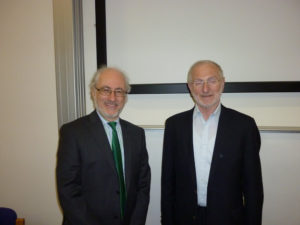A. Mark Clarfield MD FRCPC
Author of the BMJ blog about how life in Beersheva, at the medical school and hospital, has been affected by the recent conflict and sspoke to the Jewish Medical Association (UK) about his experiences.
Marc Clarfield graduated MD from the University of Toronto in 1975, and specialised first in Family Medicine, then Community Medicine and Public Health and finally in Geriatrics. Together with his wife, Prof Ora Paltiel, also a physician (haematology and clinical epidemiology), he moved to Montreal in 1978 where he was with the Faculty of Medicine at McGill University until 1992. He was Chief of Geriatrics at the Sir Mortimer B. Davis – Jewish General Hospital and head of the McGill University Division of Geriatric Medicine. He was Assistant Dean of Students from 1989-92, was promoted to a full Professorship, and has adjunct status at McGill University.
In 1992 Clarfield moved to Israel. He worked first at the Sarah Herzog Hospital, and from 1994-2001 he was Head of the Division of Geriatrics at the Ministry of Health in Jerusalem. Since 2202 he has been head of Geriatrics at the Soroka Hospital, a 1,100 bed acute care institution, and is the Sidonie Hecht Professor of Geriatrics at Ben-Gurion University in Beer-sheva.
Prof Clarfield’s research interests include Alzheimer disease and the related dementias, the organization of health care services, medical history and ethics. In addition to his scientific work, he has published medical humour, book reviews and miscellaneous pieces in various newspapers.
Press Review:
The Jewish Medical Association UK held a well-received lecture at University College London yesterday evening. The large audience included many senior members of the medical profession in London, and was attended by Board President, Henry Grunwald, QC
The lecture, entitled “A Doctor in the South” was given by Professor Mark Clarfield, Head of Geriatrics at Soroka Hospital, Beer Sheva, who spoke about his own, and the Hospital’s, experiences during the Gaza conflict.
Prof Clarfield told his audience about the work of the hospital in treating people in need of treatment, whatever their religious or ethnic background, and outlined the steps taken by the hospital to prepare for dealing with casualties of the Gaza operation, as well as the necessary precautions to protect their patients and staff during what turned out to an aerial missile bombardment of Beer Sheva.
“We functioned effectively under missile fire”, was the remarkable message that he delivered. Professor David Katz, Chairman of JMA (UK) and Vice-Chairman of the Board’s Defence and Group Relations Division thanked Prof Clarfield, saying that “This has been an opportunity to hear first-hand about the reality of medicine in Israel in the difficult times that Southern Israel in particular has been through.”

